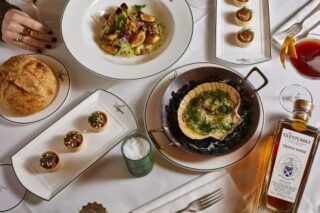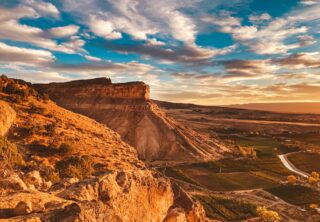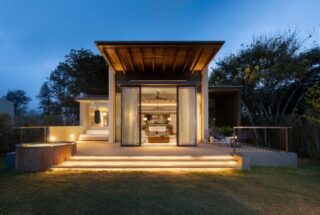This website uses cookies so that we can provide you with the best user experience possible. Cookie information is stored in your browser and performs functions such as recognising you when you return to our website and helping our team to understand which sections of the website you find most interesting and useful.
We travel to South Africa’s Brookdale Estate to discover one of the most exclusive and abundant wine estates in the world
By Juliet Herd | 28 September 2020 | Food & Drink, Travel
With local people and holistic winemaking at its core, Brookdale is soaring ahead of the competition
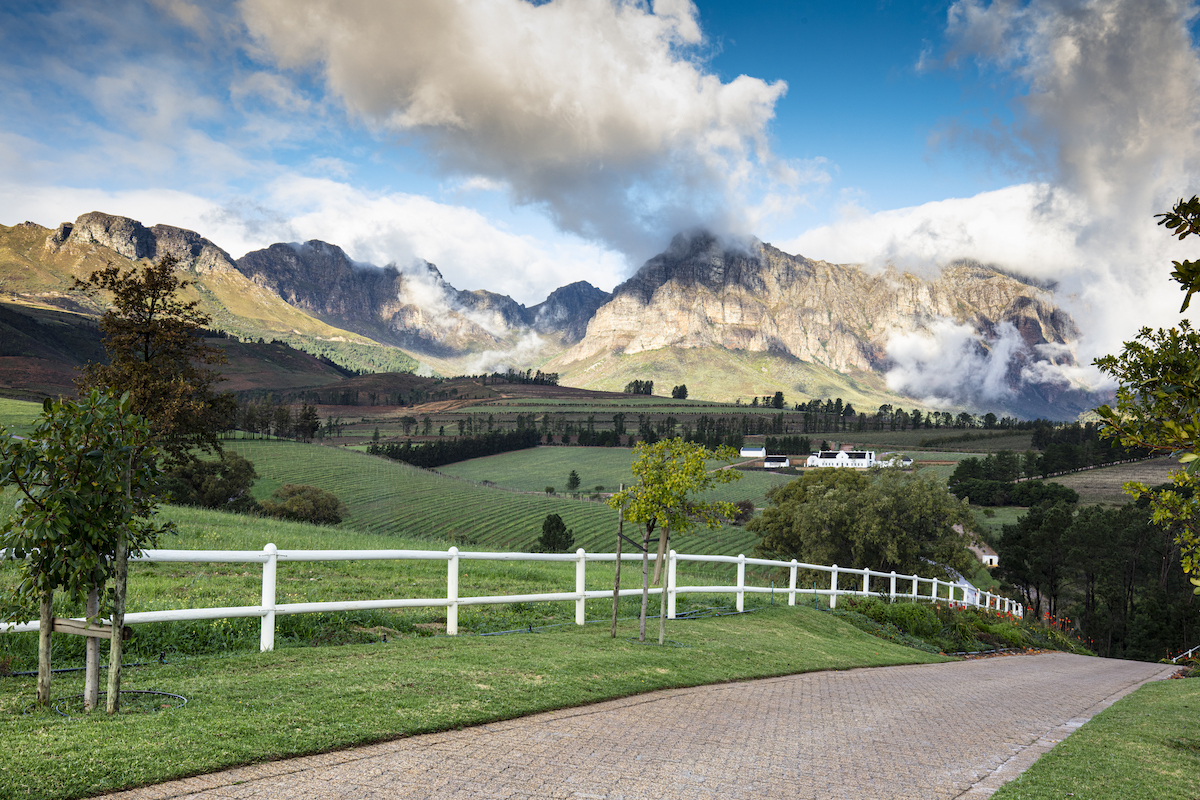
The harvest is in full swing at Brookdale Estate private vineyard at the foothills of the Klein Drakenstein Mountains in South Africa’s lush Paarl Valley. There’s a sense of urgency and excitement as owner Tim Rudd and his team race against time to pick their quota of ripe Syrah grapes before the fierce midday sun threatens to send the sugar levels rising. Crates of the perfect jewel-like black berries sit between neat rows of organic vines, waiting to be collected for processing.
By the end of the day, Rudd and his team have de-stalked, stemmed and prepared for fermentation more than 20 tonnes of grapes. Resident winemaker Kiara Scott even has the purple feet to show for it after gently treading the precious cargo herself. “It was quite a day,” she says, still smiling along with Rudd after their 14-hour stint.
The thing about this idyllic 80-hectare estate is that it is first and foremost a working farm – and, as a guest, you are encouraged to take part in the various activities, whether joining in the dawn harvest, stomping the grapes or simply enjoying a wine tasting hosted by 27-year-old Scott, a graduate of the Cape Winemakers Guild Protégé programme and one of South Africa’s most exciting young winemakers. What sets Brookdale apart from other vineyards in the Cape Winelands is that it is entirely private, so that when you stay at the manor house, you have the place to yourself. There are no public wine tastings or tours. Nor is it a hotel (you can’t help thinking it would make the perfect bolthole for privacy-seeking travellers like the Duke and Duchess of Sussex, known fans of the Western Cape area), though guests can rent the property, which sleeps up to 10 and includes accommodation, meals and activities. Permanent staff include a butler, housekeeper and private chef, with menus devised around seasonal produce from the kitchen gardens.
“We wanted to do something different,” explains the genial and gracious Rudd, 48, who named the estate – about an hour’s drive from Cape Town – after the hamlet in Derbyshire, England, where he lived for many years. “The whole concept is that you make yourself at home and treat the farm as if it’s yours. We want it to be an authentic experience.” »
South American vineyard Zuccardi Valle de Uco has been voted the World’s Best Vineyard for the second year running
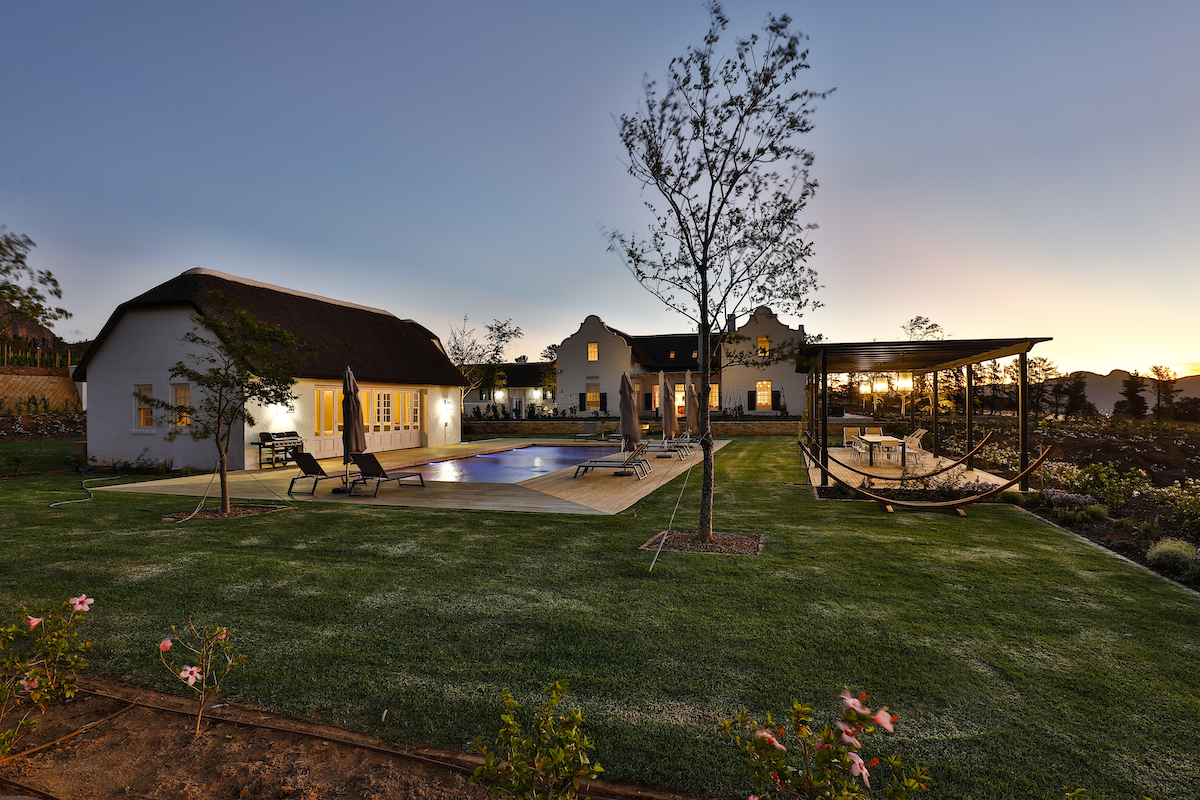
SOUTH AFRICAN STYLE
Since buying the neglected, rather run-down property four years ago, Rudd has transformed it into a thriving enterprise and mini paradise, surpassing even his expectations. Part of the New Wave South Africa wine movement, the estate has already produced its first 2017 chenin blanc vintage and there are high hopes for its unique blends, including a 16-varietal white field blend, and a sweep of reds, notably syrah, mourvèdre and grenache. The solar-powered winery is due for completion in 2021.
Following a massive replanting programme, which involved uprooting most of the original vineyards – rejuvenating only the oldest chenin blanc blocks – and planting a further 27 hectares, Rudd turned his attention to the homestead. Based on historic drawings of the original 18th-century farmhouse, the magnificent five-bedroom manor house has been built in the traditional Cape Dutch style and literally takes your breath away – from the moment you first catch sight of the distinctive rounded gables, whitewashed walls and thatched roofing along the winding 2km driveway. “Wine is all about its terroir, its sense of space, so we decided if we were going to build, it would have to be something you would only find here,” explains former property developer Rudd. “Each house [of the period] had its own signature gables, the earliest ones being a very simple, lovely rounded shape.”
The house forms a traditional H-shape, which lends itself remarkably well to modern living with the front section flanked by two generous wings running perpendicular to it, allowing the breeze to circulate freely. The imposing central staircase, all the more dramatic for the striking portrait of a young woman by local artist David Thorpe hung at the top, leads to a mezzanine floor housing four of the spacious bedrooms (the fifth is on the ground floor), complete with luxury en suite bathrooms and spectacular views. There is no such thing here as second best. “It just depends on which view you prefer,” grins Rudd. The vineyards run as seamlessly as possible up to and around the house, so that when you look outside, you see a “garden of rooms” – which is the brief he gave Cape Town- based landscape designer Franchesca Watson, who created the manor’s more formal gardens, complete with helicopter pad.
As you move between rooms – a tranquil library/study, formal dining room, two stylish sitting rooms in cool colour palettes and a vibrant breakfast room leading to the bore- water swimming pool – it’s impossible not to feel at home or to appreciate Rudd’s concept of “modern living within a traditional shell”. It’s clear no expense has been spared, from the polished oak flooring to bespoke cornicing, with the harmonious interior design testimony to Rudd’s talents as a “frustrated creative” – with
a little help from his artistic mother Lesley. “If you do something like this, you’ve got to do it properly,” he reasons, bouncing on the floating oak floor to demonstrate how expertly it’s been laid over the existing struts. The furniture is a clever mix of antique, reproduction and contemporary versions of traditional Cape pieces, such as the Pierre Cronje-designed oak dining table and yellowwood breakfast table with raspberry-coloured seats in the style of original Cape Dutch stinkwood side chairs. Vibrant modern artwork by Katie Miszewski, Junior Fungai and Dominique Salm add colour and drama while oversized sofas and deep armchairs in beautiful Mavromac & Gatehouse fabrics simply beg you to sink into them after a day hiking in the hills, shopping in historic Franschhoek or visiting the nearby Ashia cheetah sanctuary. >>
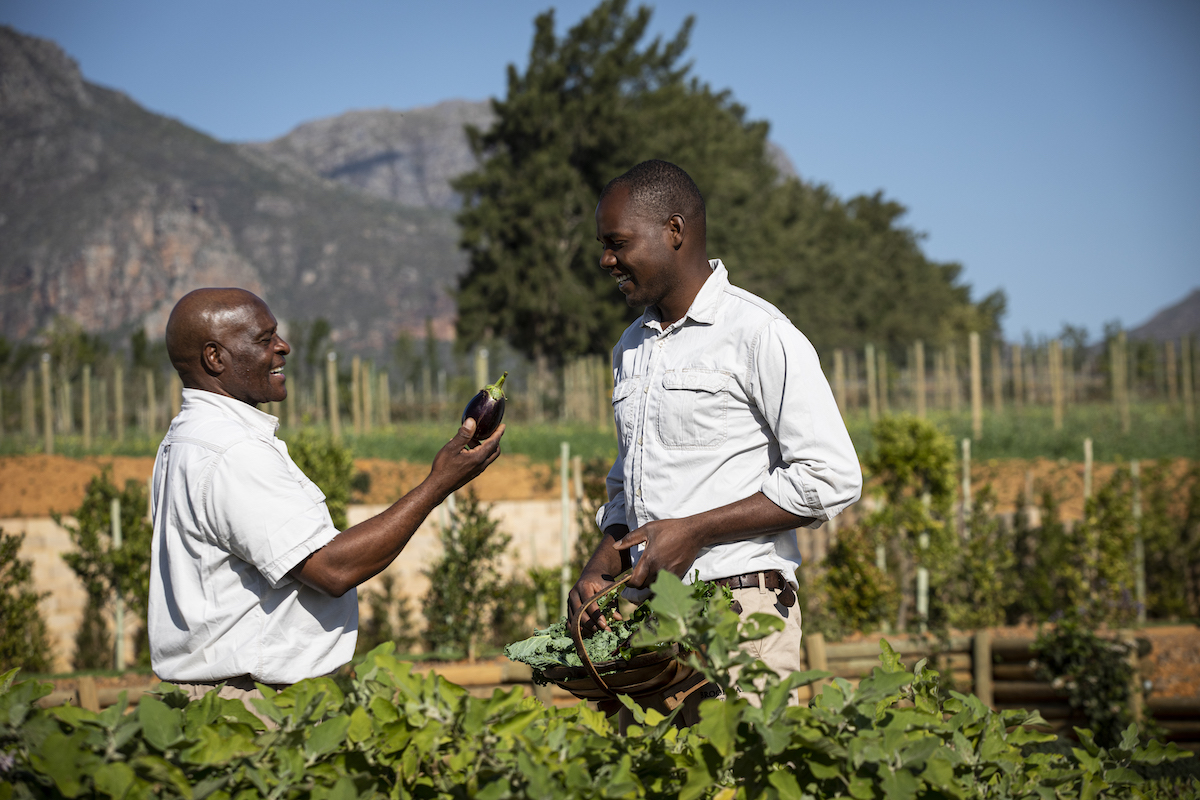
HOLISTIC HABITAT
Since taking ownership, keen conservationist and gardener Rudd has overseen the clearing of all alien vegetation, replanting the valleys with 3,600 indigenous trees and re-seeding the mountain slopes with wild Cape fynbos and flowers. On a guided stroll around the property, estate manager Schalk Pienaar points out new plantings of stinkwood, yellowwood, waterberry and milkwood trees as well as bird life including peacocks, guinea fowl and the raucous hadeda ibis. There are also fish eagles, bat-eared foxes, lynxes, leopards and porcupines, all drawn by the fertile habitat. “We’re very fortunate to have a natural source of water from the mountains,” explains Pienaar, who leads us to a stretch of green lawn with a table set for a surprise breakfast feast reminiscent of a scene from Out of Africa, prepared by chef Sue-Ann Allen, a former MasterChef South Africa runner-up.
Ah, the food. Allen, 38, describes her style of cooking as “refined home-cooking” and it’s exactly that – delicious, unpretentious and a perfect complement to wine from the estate and other local vineyards, including the nearby bio-dynamic Avondale. During our stay, we tuck into a typical South African braai, featuring wagyu beef marinated in rosemary and thyme, so tender you could cut it with a spoon, and what must rate as one of the finest carrot cakes; a “simple” lunch consisting of deboned roast chicken and nectarine and pecan salad, and a five-course formal dinner, which includes a granita made with chenin blanc juice pressed by Rudd himself. “I want to see how we can incorporate the grapes into the cooking more,” says the ebullient Allen, who has cooked for the likes of Gerard Butler and Nicole Scherzinger. “We’re also growing peach, nectarine, mango, orange, plum and pomegranate trees and will start doing homemade jams.”
The goal is for the estate to be fully self- sustainable in everything except meat and
fish, which is all ethically sourced, with most of the garden set aside for growing vegetables, herbs, salads and fruit. “We’ll make our own soap from the herbs and oil from a small olive grove and we’re also producing our own honey,” enthuses Allen.
Integral to Rudd’s 10-year vision of Brookdale as a world-class fine wine producer is its workers. For him, employing local labour is vital. “There is a huge well of experience here which most people have ignored over the years,” he says. “Our vineyard manager Ampie Dirkse is extraordinary and we’re developing this lovely team now.”
The 30-odd permanent workers are given ongoing training in everything from driving lessons to sustainable viticulture and wine tasting, so they feel invested in the success of the farm. “Traditionally, they were hired to pick grapes and then laid off,” says Rudd, whose lifelong passion for wine and farming led him to buy Brookdale with his industrialist father Sir Nigel Rudd. “We’re trying to immerse them into the culture in the same way as the French, so they understand what it is that makes wine special.”
One of just a handful of female winemakers in South Africa, Kiara Scott shares Rudd’s ambition to make “some of the best wines here ever” – and, for more personal reasons, to give back to the community. “It’s a part of me; I might as well have roots and grow here,” she says while treating us to a lively wine-tasting at the end of her long day in the field. Although she plays it down, her journey is quite extraordinary: having grown up in the apartheid suburb – or “ghetto” as she calls it – of Mitchells Plain, outside Cape Town, where gangs and addiction are rife, she managed to win a place at Elsenburg Agricultural Training Institute in Stellenbosch to study winemaking before being accepted on the trailblazing protégé programme. “I grew up in a rough community where people abused alcohol, including [some members of] my family,” reveals Scott, who plans to start her own non-profit organisation to help disadvantaged young women. “I wanted to learn about this [alcohol] because knowledge is power.” She had to overcome resistance from her conservative mother and grandmother, who raised her and her younger sister, but is pleased to report she is slowly changing their perception of wine – “because it is not a bad thing; it is something to be enjoyed and which brings people together.” As a woman, she admits, “you need to be smarter and work a little bit harder because the wine industry is male dominated. It can be challenging but it’s made me resilient and I feel so blessed. I wake up and say, ‘Yay, I get to make wine today!’”
And for that, we are all truly grateful.


